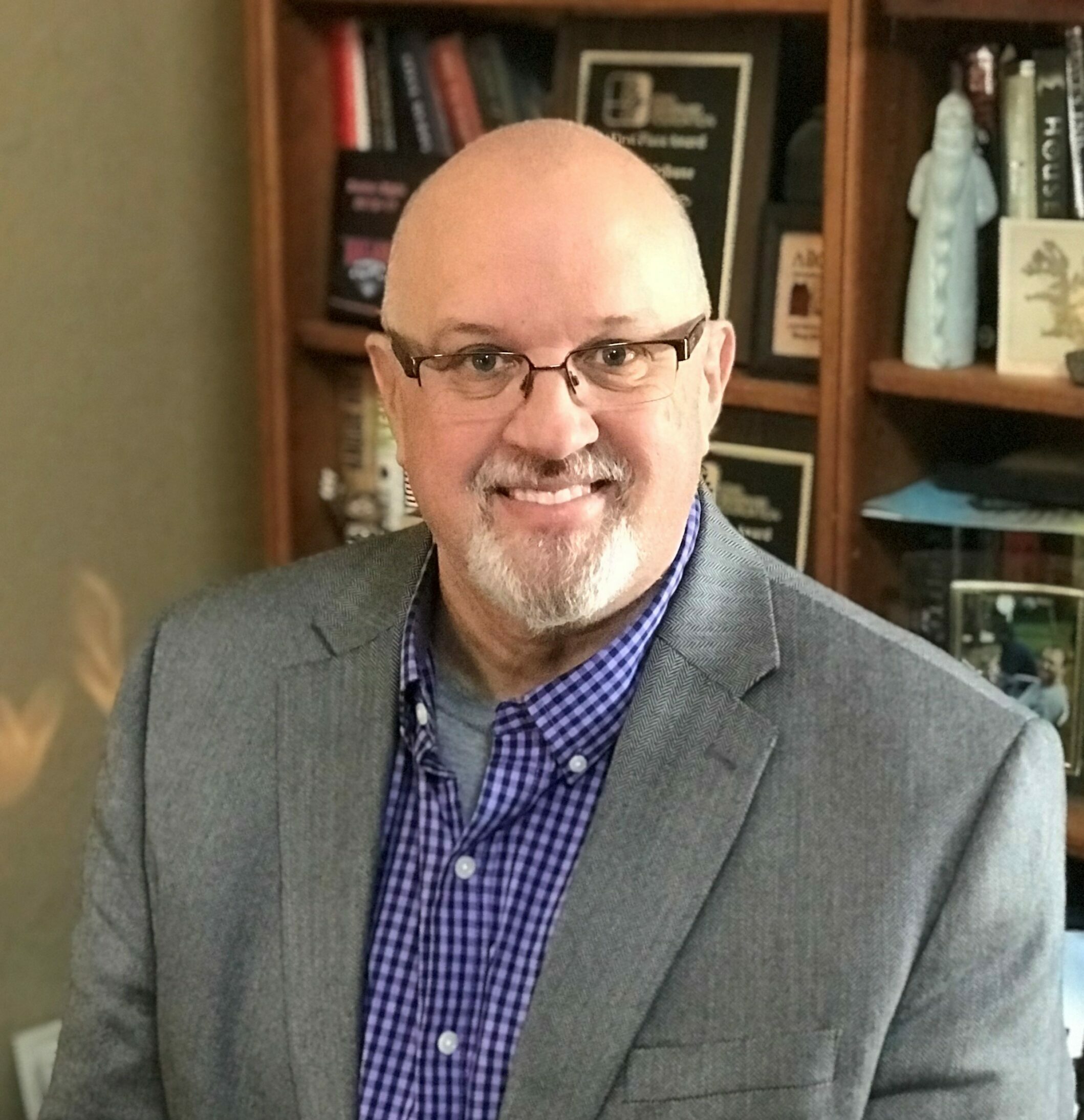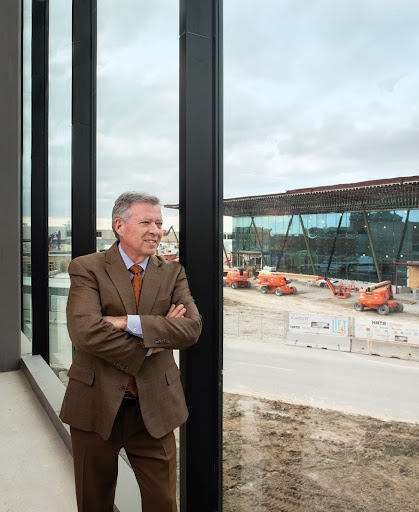Final approach
Airport's Foley talks about career, future and family as retirement nears


Kevin Foley grew up on his family’s farm near Belle Plaine, and early on he believed he’d have a career in agriculture. He got his aerial applicator’s certification and license and for a while thought he’d fly crop dusters.
Foley, 67, never flew a crop duster, but that tie to aviation followed him through his life as he now prepares to retire as executive director of the Des Moines International Airport. His last day is Friday.
The Business Record sat down with him for a conversation about his career and what his plans are after he steps away from a job that saw him lead the airport through the planning and improvements that include a new parking garage and terminal.
Foley recently marked his 11th year as executive director, a tenure that saw the airport transition from being city-run to an independent authority. Before coming to Des Moines, he was an associate professor of aviation at the University of Dubuque and held key management positions at Dubuque Regional Airport from 1992 to 2000. He also worked as a corporate pilot and is a certified flight instructor and multi-engine commercial pilot.
Foley said he was thinking about his retirement in summer 2024, and after speaking with two of his former bosses to get their advice on how much notice he would need to give, he decided to give the airport’s board of directors nine months’ notice. His retirement was publicly announced in October.
After getting funding for the new terminal and other improvements in place, Foley said he knew the time was right for him to step aside.
“So my part of educating the public and raising funds just felt like it was kind of over,” he said. “I’ve been the face and the voice of the airport, but to finish the construction it just didn’t need to be me.”
The start
Foley is quick to point out that his entire career has not been spent in aviation.
“I was a farmer first,” he said. “I farmed for nine years. There is a thread in everything I’ve done. I was a licensed applicator of pesticides and when I went back to finish my degree, what I thought I was going to be was an aerial applicator.”
But he never got in the cockpit of a crop duster after discussing it with his wife.
“My wife asked me, ‘Are you sure you want to climb back in those chemicals all day like that?’ It got me thinking, I’ve got two small children, so maybe not. I’ve never sat in a crop duster. So that’s how I got here. There is a thread all the way, and that’s how I got into aviation.”
He went on to get his commercial license to become a certified flight instructor, which opened the door for him to be a flight instructor while he finished his bachelor’s degree at the University of Dubuque.
Foley said he jumped into airport administration when the Dubuque airport started an operations department because management paid better than being a pilot.
“It was normal hours, better salary, all those things,” he said. “My licenses have never gone to waste. I have always told people that being a pilot made me a better operations officer, and being an operations officer also made me a better pilot. So the two kind of go hand in hand.”
He returned to the University of Dubuque where he earned his master’s degree and taught for eight years before joining the Des Moines International Airport as properties administrator in 2008. Foley later became deputy aviation director in January 2009 and the assistant executive director in 2011. He was elevated to executive director in February 2014.
Improvements go far beyond new terminal
While most people talk about the recent airport improvement project, Foley said there have been lots of changes along the way.
Des Moines Flying Service and FedEx have opened new facilities on the airport’s south side. Signature Flight Support also has a new facility on the south end. There are new hangars there, too, including one for an air ambulance.
“All that change down there, the general public probably isn’t even aware of,” Foley said.
One of the biggest achievements during his tenure has been the reconstruction of the airport’s runways, he said.
“We’re not an airport without the runways,” he said. “The runways were not in good shape. There were some concerns.”
It was a problem with one of the runways that Foley described as one of his worst days on the job.
It had been raining frequently and the operations staff noticed a small puddle developing on a runway during one of their daily inspections.
“It shouldn’t have been there because the runways are crowned [so water runs off], so they called the engineer,” Foley said.
The engineer didn’t come over until the next day. It had continued raining and the puddle was getting bigger. The Delta Air Lines taxiway was being rebuilt, so a machine that is used to break up concrete was brought over to test the runway where the puddle was growing.
“It hit it once and it collapsed, and the machine started going into the hole,” Foley said.
A clay drainage tile underneath the runway had broken and water had eroded away the dirt that supported the runway.
“If [the runway had collapsed] with an airplane going over it, it would have been a catastrophic event we hope we never have here,” Foley said.
It raised questions about what else was beneath the runways that people didn’t know about.
“We have some very old infrastructure here. What else is going on that we don’t know about that potentially could kill somebody?” he said. “That was not a good day.”
Another bad day was during the early days of the COVID-19 pandemic.
Airport staff was split up, with half going home to stay healthy so they could be brought back in rotation.
“I came in, the parking lots were empty,” Foley said. “Airplanes were still coming in with no passengers on them. There were planes coming in with two passengers on them. I came back to the office to calculate how long can I keep everyone on staff and on payroll if we stay like this. I calculated I thought we could make it through Christmas with the money we have in reserve. That was kind of a rough day, too.”
There were far more good days than bad, though, Foley said.
Among the best days were the passage of a Polk County bond referendum in November 2023 to help fund the airport improvement project and the groundbreaking for the new terminal a month earlier.
Looking back
After Foley graduated from Belle Plaine Community High School, he went to Iowa State University to major in agricultural education.
He didn’t finish and instead came home, worked for the local cooperative and was in their management program.
“I always thought, I think I want to farm, that’s what I want to do,” he said.
Foley said 400 acres of land came up for rent near his dad’s farm, so he rented the equipment to operate it. Some other property came up for rent, so he and his younger brother formed a partnership and worked the land until they decided it was no longer financially feasible.
“This was in the 1980s, and I just didn’t see it getting any better, so I had to change to do something while I’m young enough to change and do something that makes a living,” he said.
Foley said he never envisioned at that time that he’d finish his career leading the Des Moines International Airport.
What’s next?
Foley said he’s not worried about his retirement in the short term.
“Initially, there’s the honey-do list, right?” he said. “And I have my own list of things I want to get done. My wife and I still have some farm ground [that they lease to a tenant near Belle Plaine] that needs attention, but I’m not going to do manual labor. I’m not going to dig fence posts or string wire or anything like that.”
There’s a fishing trip planned, along with a trip to Hawaii next year. There’s also a possible trip to Mexico, along with the usual projects around the house.
“There’s plenty of things to keep me busy,” he said. “As long as I feel productive I’ll be fine. But if I get bored, I may be out there looking.”
Foley and his wife have two children and two grandchildren.
“Whether it’s because of me or in spite of me, my best achievements are that I’ve raised two children who are very productive citizens, who are engaged and active in their communities. That’s my proudest achievement, to see them grow and have their own successes.”
His son is an engineer with Hodge Co. in Davenport. His daughter is an item manager for the Department of Defense and lives in Michigan.
Advice
When asked what advice he’d give today to himself when he was starting out, Foley said: “It will be all right. It’s going to turn out OK. Don’t worry about it.”
“The other is maybe to pay a little better attention to family,” he said. “I’ve been very career-oriented, mostly because I felt like I had to.”
Foley recalled a conversation he had with his wife after they met with a young man who was seeking advice about becoming a commercial pilot.
“My wife said, ‘I don’t think he’s got the drive,’” Foley said. “And I said, ‘Do you think that’s what it takes?’ And she said, ‘Well, that’s how I would describe you, is driven.’”
“So maybe take a breath, enjoy life a little more,” he said.
The last day
There is a party planned for Friday to celebrate Foley. In addition to airport staff and community members, his brothers and sisters are planning to come in from across the country. There will also be a lot of people he hasn’t seen in a while, some former co-workers from Dubuque and a few college friends, too.
“If I have to speak, it might be tough,” Foley said. “I’m looking forward to the next chapter, but at the same time, this has been home for 17 years. This is as long as I’ve ever worked in any one place. So if I have to speak, it might be a little difficult.”

Michael Crumb
Michael Crumb is a senior staff writer at Business Record. He covers real estate and development and transportation.









